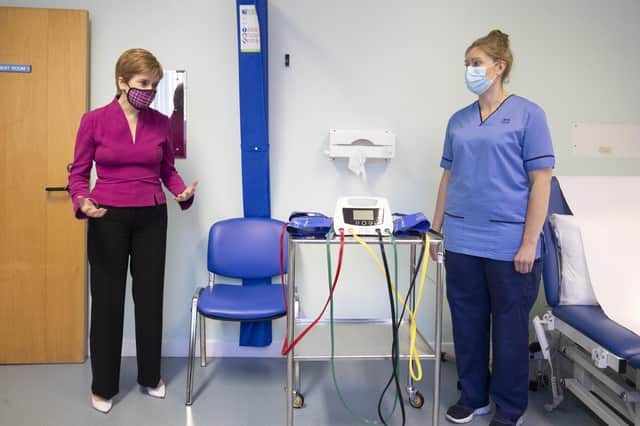Euan McColm: SNP must do more for private sector to boost nation’s wealth


The timing was… let’s say interesting. Even the most casual sceptic might have regarded this as a pretty blatant give-away, a piece of pre-campaign campaigning designed to make Sturgeon’s administration looks especially munificent. With Prime Minister Boris Johnson proposing a meagre one per cent rise for health service workers in England, here was Sturgeon saying that Scotland was a fundamentally fairer, more compassionate country.
Regardless of the First Minister’s motives, few would complain about the decision she announced, particularly after events of the past year. During the coronavirus pandemic, NHS staff have been on the frontline, many risking their lives to save others, and who would dare argue that they don’t deserve some financial reward for that?
Advertisement
Hide AdAdvertisement
Hide AdBut Sturgeon’s announcement also brought into focus a gap in Scottish Government thinking. This SNP administration frequently pays attention to those working in the public sector while all but ignoring the private one.


More than one in five Scots workers - 566,000 of around 2.5million - are employed in the public sector and the Scottish Government can, reasonably easily, positively impact their working lives. It has the power to impose positive conditions and to grant substantial pay rises on the eves of elections. But those private sector workers? Well, they’re someone else’s problem.
That attitude has long existed in the SNP which has what might best be described as a difficult relationship with the private sector. The tension between our nationalist government and our major employers was further exposed last week with the publication of a new report prepared by the consultancy Oxford Economics and commissioned by businessman Sir Tom Hunter.
The report makes the point that, for decades, Scotland’s GDP per head of population has lagged behind that of the UK as a whole. Two years ago, it was a full eight per cent lower.
Forecasting a bleak future for Scotland’s growth rate, Oxford Economics called on the Scottish Government to spend a greater proportion of its budget on economic development and proposed significant tax cuts and deregulation to incentivise business and create a more competitive economic climate.
Those who believed that Scotland’s economy might be transformed under current economic policies were, said the report’s authors, very much mistaken: transformational economic improvements would require some serious rethinks at either the Scottish or UK levels.
Scotland has a problem with the input of business leaders in our national debate and it’s one of the SNP’s making. During the 2014 independence referendum, any suggestion from the private sector that breaking up the United Kingdom might have a financial downside was quickly attacked by senior nationalists as the stuff of “project fear”. There was never any attempt to engage in debate because to do so would have been to recognise that concerns might have had some legitimacy. It was far more politically expedient to ascribe sinister ulterior motives to those speaking out than it was to entertain the idea that they might have a point.
Not only does the Scottish Government display great antipathy towards the input of business leaders, ministers seem more comfortable using the sort of rhetoric we might expect from the radical left. There is little appetite to engage in discussion about tax cuts or business incentives when the overarching SNP story is that Scotland is uniquely “progressive”. When it comes to economic policy, Scottish Government thinking is the stuff of idealistic student union debate.
Advertisement
Hide AdAdvertisement
Hide AdBut business is not the enemy. Without wealth creators like Sir Tom Hunter, there wouldn’t be the money to give NHS workers their tidy pay rise. There wouldn’t be an economy to discuss.
This is a peculiar blind spot for the SNP to ignore. If the objective is the creation of a vibrant, healthy independent Scotland then the economy should be a priority. Rather than dismissing the concerns of employers with “project fear” slurs, SNP ministers should be engaging with them and trying to find solutions with which both are happy. It is entirely in the interests of the nationalists to do this. If they care about the viability of an independent Scotland, why wouldn’t they want to ensure that the pitch was prepared for business to succeed?
Sir Tom Hunter suggests that, while coronavirus continues to wreak chaos, a second referendum is out of the question. Despite SNP promises of Indyref2, this is a point with which Nicola Sturgeon appears to agree. She has repeatedly said that her focus, for now, is on recovery from the pandemic.
If this is so, then she should see the Oxford Economics report as an opportunity rather than as a challenge to her plans.
It is time for the Scottish Government to build bridges with the private sector and to develop policies which might boost GDP. It is time for the Scottish Government to listen to business leaders because their success is, to a very large degree, the country’s success.
Few people, I’d wager, would have been opposed to the First Minister’s decision to reward NHS workers. A decent pay rise was long overdue. But where is Nicola Sturgeon’s helping hand for the private sector? Where is her recognition of the efforts of those wealth creators who have kept Scots in employment during these difficult months of lockdown?
If the SNP is serious about building a successful, wealthy independent Scotland, the party must work with the private sector rather than ignoring – or, worse, dismissing – its needs.
Comments
Want to join the conversation? Please or to comment on this article.